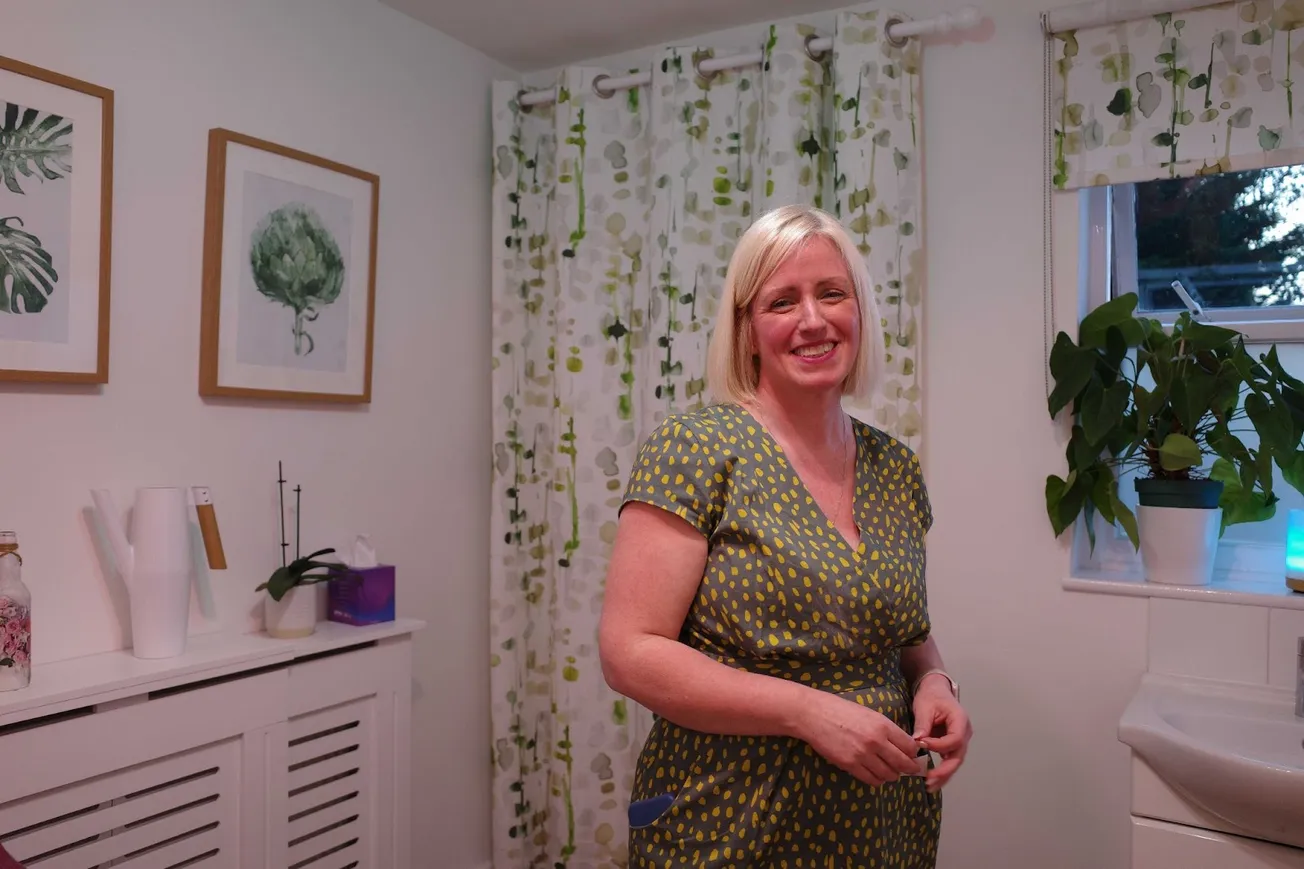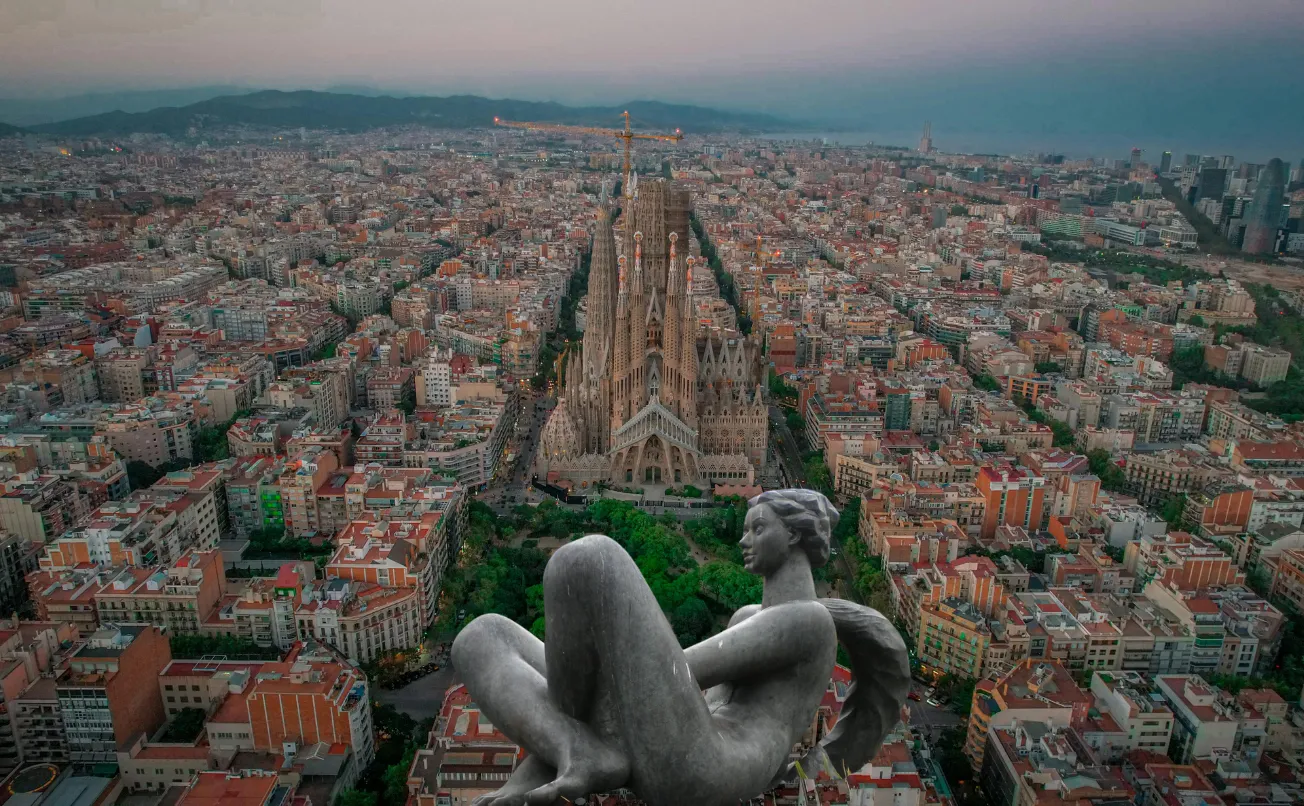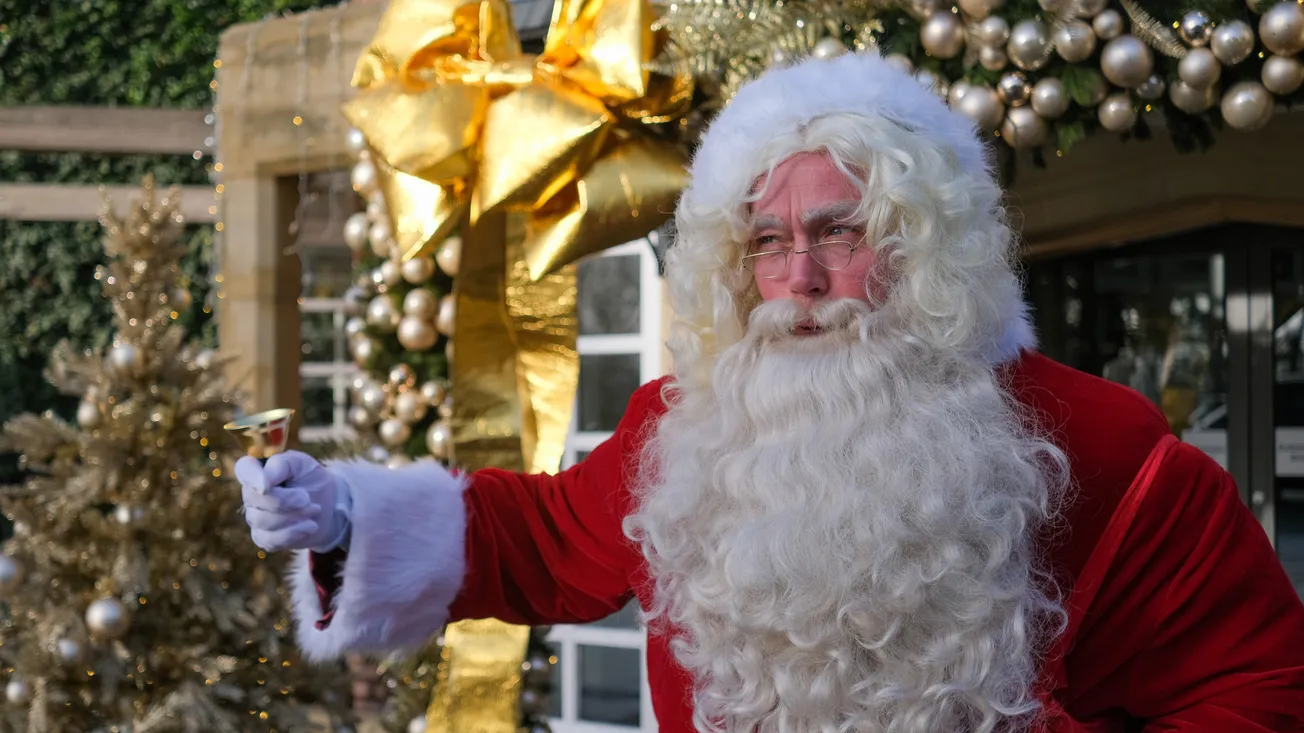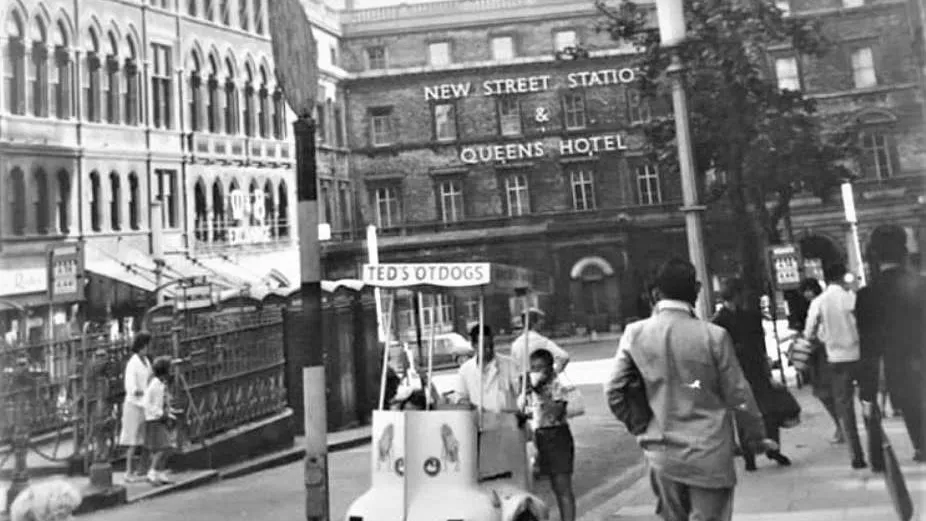“It’s not often you see people queuing up outside a funeral home,” points out Alison, quite rightly. We’re in King’s Heath, across the road from Sunshine Cafe, and 30-odd people holding glasses of white wine or handfuls of M&S crisps are cramming into the tiny front room to escape the slowly setting sun. Before it was a funeral home, A Natural Undertaking was a hairdresser’s, fittingly named ‘Curl Up and Dye’. Since then a lot has changed about the place, but they’ve still kept one of the salon sinks for washing the hair of the dead.
I’m here to meet the undertakers. This is part of Birmingham’s A Matter of Life and Death festival, an annual occurrence that aims to promote healthy and productive conversations surrounding death and dying. The programme includes a series of Death Cafes, during which the bereaved, the terminally ill, the death-fearful, or the death-curious, can talk freely about our shared and inevitable quietus over a mug of Tetley’s and a custard cream.
Now in its eighth year, the festival has spread out across the city, with visits to various cemeteries, The Coffin Works Museum, and also the local undertakers. This is where I am now, and where I first meet Alison Cox. Alison is a death-doula-in-training, learning to offer emotional support and guidance to the imminently dying, and she’s also a member of BrumYODO, the organisation that started and continues to run Birmingham’s only death festival.
“Brum is short for Birmingham, and YODO stands for You Only Die Once,” Alison informs the rather mismatched group of middle-aged blokes, made-up women in sundresses, and a couple of young families that crowd the Funeral Home reception room. “Though, of course, some people don’t believe that you only die once,” she adds tentatively.
BrumYODO began in 2015 as a small grassroots support network run by a group of undertakers, artists, and morbidly curious activists, with the shared goal of demystifying death, and doing away with the taboo surrounding the subject. What started as a number of small events during the national Dying Matters Awareness Week transformed into a fully-fledged festival that has now been running for nearly a decade. The work of BrumYODO has played no small part in gaining Birmingham the title of the UK’s first Compassionate City, a title awarded to cities in which the community has come together to help those experiencing death and loss.

But when Alison asks our group, not one of them has ever heard of Compassionate Cities, let alone known that Birmingham was the first in the UK, or why. The Compassionate City Charter outlines 13 commitments that a city may take to achieve the title, ranging from the oddly specific (number 11 suggests an annual death-themed short story competition), to the truly poignant and necessary (number 13, for example, states that institutions for the homeless or the imprisoned should show evidence of providing end of life care, and support for those experiencing bereavement). Birmingham earned its compassionate stripes in 2022, in the aftermath of the Covid pandemic, partly due to its widespread networks of support, and partly due to events such as the one I’m at now – an invitation to meet the undertakers, and speak openly and frankly about what happens to our bodies when we die.
The first undertaker I meet is Fran, a neat, polished woman who I reckon I’d trust with a cadaver, though she doesn’t necessarily look the type who’d want to deal with one. This might be part of the point – the norms surrounding what a funeral, an undertaker, or a celebrant should look like, is a big part of why Fran became an undertaker in the first place. Addressing the group, she recalls struggling to distinguish between any of her grandparents' funerals, all of them characterised by severe-looking men reading sermons, and strangers in top hats carrying her relatives’ coffins. It didn’t seem right, for such distinctive personalities, that their final moments above this earth should be so uniform. “People are more individual than that.” she asserts.
Alongside her business partner Carrie, Fran started A Natural Undertaking with nothing but a car, a website, and a stretcher to ferry the bodies to the morgue. They didn’t even have their own premises, until they came across the morbidly named hairdressers, saw it was for sale, and took it to be a sign. The salon premises has in many ways both shaped and reflected the work they do as undertakers.
Traditionally in a funeral home, the dead are taken in through the back door, but a number of tricky-to-navigate steps has prevented Fran and Carrie from doing so. On the other hand, the front door is wide and easy to access. The two of them decided to listen to what the building was telling them, and realised it was right. “Why should the last time a person enters a building be through the back door?” Fran asks, to herself more than anyone. This is precisely what A Natural Undertaking is all about — transparency. It’s also why we’ve gathered here today, to ask questions, and Fran encourages us to ask whatever is on our mind about death, dying, the dead. No question, she asserts, is off limits.
“What do you do if their face is all burnt and destroyed?” comes the first question, almost instantaneously. It comes from a member of the group standing directly beside me, a child of about eight or nine wielding an overflowing cup of lemonade, and the enviable interrogational skills of a budding investigative journalist.
This question proves crucial. Fran explains that at A Natural Undertaking they don’t embalm the bodies, or take part in any procedures that could be considered invasive towards the dead. This is not to say that they don’t do anything cosmetic. They’ll apply lip balms and moisturisers to keep the faces of the dead from drying out. They generally avoid putting cosmetics on those who didn’t typically wear them when they were alive, but at times, say if a young woman has died, they’ll have her friends come do her makeup as she would have liked it.

This is all a part of responding to the individual needs of the deceased, and of the bereaved. One procedure that they take part in which could be considered invasive is closing the mouths of the dead, which involves using a needle and a wire threaded through the mouth and nose, to ensure that the jaw remains shut. A small procedure like that, Fran explains, can be a huge help psychologically. Some of the bereaved may have witnessed a traumatic death – with their friend or relative dying with their eyes and mouth open – and to be able to return and see the body looking at peace can provide invaluable closure. In this situation, Fran emphasises how important it is to be completely open about what operations have taken place.
But she also adds that too much cosmetic alteration can have a negative emotional effect. If a body simply looks like it is sleeping, not dead, this can affect a person’s closure, or even acceptance of the death. “Does it actually help us, psychologically,” she asks, “to see a dead body that looks like it could just get up and go?”
The next question comes from a man sitting around the corner from me, obscured from my view. He asks Fran about the weirdest request they’ve ever had from a dying person, with regards to their own funeral, and Fran tells us about a fancy dress funeral they once arranged, where the deceased was dressed up as a 1920s flapper. “I was going to Abba Voyage two weeks after,” Fran says, “so I already had an outfit ready. When we went to get the body, we got out the hearse while blasting ‘Dancing Queen’.” Before the lady died, but after she’d made her funeral wishes clear, her family and friends started preparing their outfits. On her deathbed, she received countless pictures from her loved ones of the elaborate costumes they were going to wear. There was a seven foot dinosaur, Fran tells us, and a bottle of Budvar. One man had to walk backwards because he had flippers on.
This is a far cry from the strangers in top hats of Fran’s childhood funerals. Being able to talk openly about death means that the dying can comfortably make their wishes known, and perhaps even more importantly, it means that they won’t feel so alone in the process.
Moving out of the reception and shuffling past the large and looming fridge where the bodies are kept, we enter a calm little room with green curtains, soft lighting, and a neat, clinical bed in the corner. This is the viewing room, where friends and families can come to see the body if they wish. It’s also where I meet the second undertaker, Suzy, a small, blonde woman whose green and yellow spotted dress matches the curtains. Suzy has worked at A Natural Undertaking for just over two and a half years. Before that, she was a bridal consultant. “Weddings and funerals are the same,” she announces to the group, “except with funerals, the main person doesn’t go to the afterparty.”
The first question anyone asks Suzy is if the change in career has affected her at all psychologically. “Not really,” she answers cheerfully. “Except I have to go to bed with white noise now to get myself to sleep.” This, she informs us, is more due to the responsibilities of her role, rather than any serious emotional scarring. Ultimately, she prefers the role of undertaker: “It’s nice after being a bridal consultant to not have people talk back.”

Suzy shows us around the viewing room, or ‘Your Room’, and explains the little things they can do to make viewing a dead loved one more pleasant, or perhaps just less unpleasant. If the deceased wore a particular perfume, Suzy tells us, then they’ll douse the room in it. They have colour changing light bulbs to contrast with the skin tone of the dead, who may have gone a little green or yellow since passing. The bodies will be dressed in their own clothes, and their visiting loved ones can bring objects to decorate the room with.
One member of our group chimes in with her own experience of the room – her father had recently passed, and Fran and Suzy had arranged for him to be in his hunting gear for the viewing, with his shirt sleeves rolled up just like he would have worn them. Like Fran, Suzy also emphasises the importance of transparency at this moment in time. During the viewing, she’ll explain in simple terms any physical transformations the body has undergone, such as facial bruising or the darkening of the fingertips. The point of seeing the body is not to hide the fact that they are dead, but rather to accept it, and to see them at peace.
This is not always simple, and the viewings are, of course, deeply charged and deeply emotional events. Fran and Suzy are not immune to these emotions. One of the first things Suzy learned after starting this job is that there isn’t a waterproof mascara that actually works. This, she knows, is an unconventional response from undertakers, who are expected to display a level of detachment. While she emphasises the importance of keeping a distance, and of being a neutral party, Suzy believes that as an undertaker if you completely detach yourself emotionally, you’re not doing your job right. There are always going to be the deaths, and the funerals, that get to you, and she notes the humorous side of swapping out the severe-looking, black-suited men for, as she puts it, “two short blonde ladies crying in the back of the room.”
But, of course, this is what the Matter of Life and Death Festival is all about in the first place —- compassion. A Natural Undertaking, and BrumYODO, are trying to do away with the stereotype that death needs to be a solemn affair. Some deaths are more complicated, involving various squabbles between the dead’s family. “We’ve had to keep exes apart before,” Suzy tells us. “One time we had to hold four different wakes for one person.” Other funerals, like the fancy dress affair, are essentially joyous occasions. Ultimately, the aim of the undertakers, and of the festival, is not to create a single model of the best, easiest kind of death, but to cater to the individuality of a person's life, even after they’ve passed away.
“Do you think death brings out the best, or the worst in people?” A member of our group asks Suzy. She pauses for a moment, then says: “I think it’s about 50/50.”








Comments